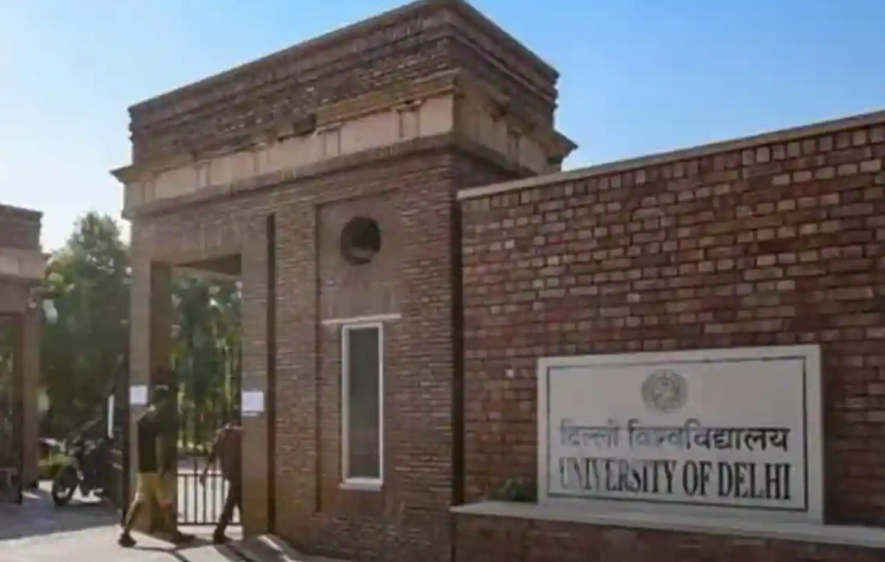'Reconsider Maths Syllabus if you Want Good Graduates': DU Teachers Tell Dept Head

Calling the redesigned four-year undergraduate Mathematics course a setback for the students of the Mathematics honours programme at the Delhi University, over 50 teachers from different colleges has written a letter to the head of the concerned department. They have alleged that it will lead to a lesser understanding of the core components of the subject.
The teachers alleged that the department should have placed the entire course structure and syllabus instead of that for only first-year in front of the Academic Council. This would have informed the aspirants about the subjects to be taught in the course.
The letter reads, “Widespread consultation with college teachers, who have been teaching this course and are aware of the needs of undergraduate students, is desirable. For this, a General Body meeting of all such teachers should be held, as was done in the past. We are deeply dismayed that not only was a GBM not called but in a meeting of a committee of select representatives called by the department, the concerns raised by several college teachers were brushed aside.”
As per rules, any course syllabus is sent to the committee on courses for approval. After getting the approval, it is sent to the faculty of the department, where a sub-committee would look into the structure and components of the syllabus. Then it is sent to Standing Committee on Academic Affairs. In the last step, it gets approval from the Academic Council and the Executive Council.
Nandita Narayan, former president of Delhi University Teachers’ Association, who teaches at St Stephen’s College, told NewsClick over the phone that it was a chaotic situation where the heads of the departments did not find it fit to consult the components of the courses with the teachers who will teach in colleges. She said, “Departments have been following a democratic tradition where a general body meeting is called to discuss the structure of the course. Then it is referred to relevant bodies. Although it is not a rule, it has been followed over the decades. The decision of the heads has been taken arbitrarily and students will suffer very dearly.” She added, “The haste in implementing the new FYUP is such that they have not finalised the entire syllabus of the course. If it is to be evaluated honestly, I would say the passing students will hardly be a graduate, let alone a master, and the officials of UGC are claiming that the students can directly get into PhD courses !”
Commenting on the components of the course, the teachers said that the lecture credits assigned to the core foundational courses of Analysis and Algebra have been drastically reduced in the proposed new structure from 25 each to 15 each. They said the move will adversely affect the conceptual base of Mathematics Honours students. On the other hand, three courses that were electives in the current LOCF course and one from the PG curriculum have been put into the Core DSC courses in the proposed FYUP course. According to the teachers, this is not desirable, as introducing new core courses should not be at the expense of the existing core courses that are indispensable for laying a solid conceptual foundation.
Manoj Kumar, who teaches at Deshbandhu College and is one of the signatories of the letter, said that the content that was covered in five lectures is now proposed to be covered in only three lectures and it is not feasible. He said, “Either the content should be reduced, or the same content should be covered over two papers instead of one. For example, in the current LOCF, two full papers cover concepts in Elementary Analysis (Structure of Real Numbers, Sequences, Series, Limit, Continuity, Derivability and Applications); that is a total of 5x2=10 lecture credits. Teachers found even these ten lecture credits hardly sufficient to do justice to the course. This is because the students who are being introduced to modern abstract mathematics for the first time find these concepts extremely difficult to comprehend.”
Kumar added, “In the proposed new structure, this has been reduced to 3 + 2 lecture credits (the latter being eked out from the Calculus paper). Instead, there should be three clear papers for Elementary Analysis, giving us a total of nine lecture credits, which is the bare minimum required. There should be no attempt to reduce the content or rush through the foundational concepts in Analysis and Algebra, which, after all, lay the base for all advanced mathematics.”
He further said, “The content of the Calculus paper in the proposed structure hardly has any classical Calculus in it. This paper should be fully devoted to Basic Calculus (Applications of Differentiation, Integration, Curve Tracing, Areas, Volumes, Surfaces etc.) as we have in the current LOCF syllabus. This will reinforce the students’ fundamentals in Calculus, increase their comfort level in their very first semester (while struggling with entirely new concepts in the other two papers) and give them hands-on exposure to applications through the practicals. Keeping in mind the exit option, this will enhance their prospects of employability as well.”
Get the latest reports & analysis with people's perspective on Protests, movements & deep analytical videos, discussions of the current affairs in your Telegram app. Subscribe to NewsClick's Telegram channel & get Real-Time updates on stories, as they get published on our website.
























